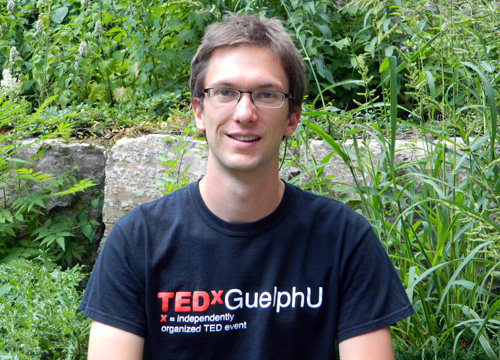
To understand the TEDxGuelphU club at the University of Guelph, you might need a little background.
TED stands for Technology, Entertainment and Design. You’ve probably seen that acronym before: videos with the TED label are all over the Internet. The TED organization started in California three decades ago as an annual conference about what its founders called “ideas worth spreading.” Since then the conference has gained worldwide recognition through an ever-growing collection of TED talks, which have been shared widely across the Internet.
And TEDx? Chris Pond, a third-year biological engineering co-op student at U of G, explains that as the TED events grew more popular, the founders began to license groups to run independently organized events. The little “x” denotes one of these. There are also other offshoots created by the original TED group: TEDMED, for example, looks at ideas related to medicine.
“Now there’s an average of five events every day around the world,” says Pond.
The U of G club got its first licence in 2010 and must re-apply each year. The licence allows them to run one conference. The 2013 U of G event is Nov. 23 in Rozanski Hall. Tickets are $25; the deadline to request a ticket is Nov. 13 at 5 p.m.
Pond says, “The TEDx events follow the same format and guidelines as the original TED conferences, and the emphasis is on highlighting members of the local community (Guelph, in this case) and the ideas they have to share.”
His own first experience with the TED concept was when he attended the 2012 event at U of G. “What struck me was that you are urged to discuss ideas you otherwise wouldn’t even know about. The activities encourage you to think in new ways. Even during the breaks between sessions there are activities and ideas being presented. It just seemed to open up so many possibilities.” He joined TEDxGuelphU the following month.
“We invite professors and members of the community who have interesting ideas that we think deserve a wider audience,” Pond says. Usually, about 10 speakers are chosen.
Each speaker is given between four and 18 minutes to speak – another TED rule. “According to TED, this is the ideal range during which people will stay engaged and absorb information,” explains Pond. One of his favourite talks last year was by Jordan Scholl, B.Sc. ’11 and M.Sc. ’12, who completed his master’s in anatomy and physiology at U of G.
Scholl began by performing a song and then explained the anatomy of singing and what is required physiologically for singing to work. He sings with the Elora Festival Singers, which has been nominated for both a Grammy and a Juno. Click here to see the video of his presentation.
After each talk, there is a break with coffee, discussion and activities to stimulate more ideas. One of last year’s break events featured the work of fine art professor Christian Giroux and engineering research associate John Phillips in their digital haptic design lab.
Only 100 people can attend each TEDx conference, so potential audience members need to apply in advance; a committee of club members reviews the applications.
Many club members also volunteer at the event. “This is not a one-man show,” says Pond. “While I am the co-ordinator this year, it takes a lot of work by many people to make it happen.”
On Nov. 23, the conference will be live-streamed to the website TEDxGuelphU.com. All presentations are posted on YouTube after the event. This year’s event will also be simulcast live to a meeting space at 10 Carden St. in downtown Guelph.
Pond says he found working on a TEDx conference pretty daunting in the beginning, but he believes the concept is vital. “The way I think about my future is different now because of TEDx. It is very easy to get onto a career path and lose sight of what is around you. In fact, I think it is a potential flaw of university – you spend four years studying a single subject to earn your degree, with other people who are focused on the same subject area, and you don’t see anything else. TED is about connecting with other ideas and seeing in new ways.”